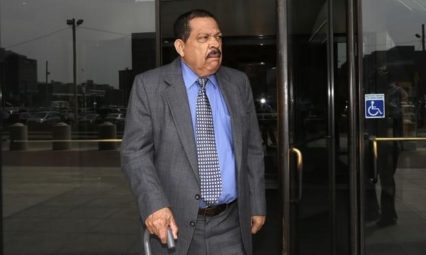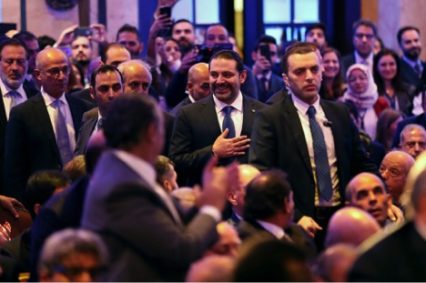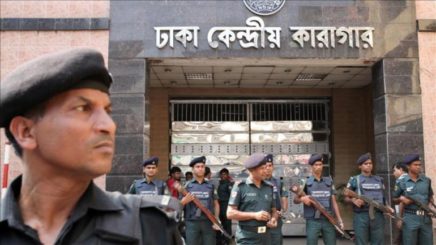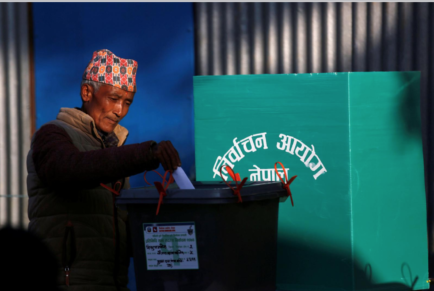|
| |
This week in: Peace & Security Publications |
IPSI | Africa | Americas | East Asia | Europe & Central Asia | Middle East | South Asia
|
|
|
|
| |
Applications now Open for the 2018 Sarajevo Symposium on Post-Conflict Transitions
IPSI’s Sarajevo Symposium on Post-Conflict Transitions, 7-22 July 2018 provides a unique opportunity to explore new topics, build practical skills, and meet the world’s top practitioners and experts on post-conflict transitions. During our two-week intensive training, participants will gain a cross-sectoral perspective on post-conflict transitions by looking at topics such as sequencing, governance, security, justice, and reconciliation in post-war countries such as Bosnia and Herzegovina and many others. An exceptional faculty will guide participants through these topics and geographical contexts using lectures, in-depth discussions, simulations, role plays, and other experiential exercises. Transferable MA academic credit is available.
|
|
|
|
| |
This week in Sub-Saharan Africa
|
|
|
|
| |
KENYA: Police teargas opposition leader as swearing-in for President Kenyatta masks fragility of “98%” election win
On Tuesday, President Uhuru Kenyatta was sworn in for a second term shortly before riot police teargassed the convoy of opposition leader Raila Odinga, who promised supporters he would be sworn in himself on December 12. Such a move by the opposition deepens divisions opened by the extended election season in Kenya. Months of bitter campaigns and sporadic clashes have already blunted growth in East Africa’s most succesful economy. At a lavish inauguration attended by the heads of many African nations, Mr. Kenyatta did his best to paint a picture of a country moving beyond that divide. Comment: Mr. Kenyatta won a repeat presidential election on October 26 in a second special election that was boycotted by Mr. Odinga, who said it would not be free and fair. The Supreme Court nullified the first presidential election, in August, over irregularities. (Independent, Washington Post, EWN News)
|
|
|
|
|
| |
SOUTH SUDAN: Tribal Militia kill 43, abduct women and children
On Wednesday, a tribal militia killed at least 43 people in Jonglei state in South Sudan, extending a spate of tit-for-tat revenge killings. Raiders from the Murle ethnic group killed 20 men, 22 women, and one child, and injured 19 people. The UN Office for the Coordination of Humanitarian Affairs said that among those killed were six staff members of local aid organizations. The United Nations Mission in South Sudan (UNMISS) reported that about 60 women and children had been abducted and plans to send a peacekeeping patrol and human rights monitors to the area of the attack. Comment: The Oil-rich South Sudan dissolved into civil war in 2013 driven by a rivalry between rebels, the military, and tribal militias. More than a third of the country’s 12 million population have fled their homes. ( The UN News Centre, Daily Nation, Reuters)
|
|
|
|
|
| |
ZIMBABWE: Robert Mugabe offered USD 10 million payoff and immunity for his family
This week, news of President Robert Mugabe’s immunity sparked criticism from activists, including clergymen who called for the 93-year old to face trial for alleged human rights abuses that date back to the beginning of his presidency in 1980. According to emerging details, the deal could see the former first family receive a total of up to USD 10 million on top of their annual salaries complete with medical and travel benefits as part of a deal negotiated before the resignation. Although Zimbabwe is in a post-Mugabe era, most people are still fearful of publicly sharing their opinion on the former leader. Comment: Mugabe resigned as president on November 21, following a military takeover on November 15 that saw the veteran leader primarily confined to his private residence by the army. (Al Jazeera, The Guardian, Huffington Post)
Researched/Written by Brian Adienge
|
|
|
|
|
| |
This week in the Americas & Caribbean
|
|
|
|
| |
HONDURAS: Opposition candidate in controversial presidential election rejects poll count
On Wednesday, protests occurred in the capital city of Tegucigalpa as Hondurans voted to elect a new president. Honduran President Orlando Hernandez seeks re-election and leads the ballots by 88 percent, but opposition candidate Salvador Nasralla believed the electoral court to have manipulated the ballots. The final presidential election results will be received by Thursday. Comment: The electoral commission is led by allies of the Hernandez presidency, which Nasralla has credited as fraud and the reasoning for losing his lead days before the ballots closed. (The New York Times, Al Jazeera, NPR News, BBC News)
|
|
|
|
|
| |
UNITED STATES: White House considers plan to replace Secretary Tillerson
On Thursday, various officials from the Trump Administration stated that a plan has been discussed to replace Secretary of State Rex Tillerson with CIA Director Mike Pompeo. If Secretary Tillerson is replaced by Pomepo, Senator Tom Cotton would move into the position of CIA Director. The plan to oust Secretary Tillerson was, according to U.S. media – including The Washington Post – created by White House Chief of Staff John Kelly, although there has been no public confirmation by President Trump. Comment: Tillerson’s fate as Secretary of State is reportedly in jeopardy due to rising tensions with President Trump over foreign policy, including Tillerson referring to President Trump as a “moron” and refusing to send a State Department employee to join Ivanka Trump in India this week. (The Washington Post, The New York Times, NBC News, BBC News)
|
|
|
|
|
| |
VENEZUELA: Maduro set for possible reelection in 2018
On Thursday, Vice President Tareck El Aissami announced that President Nicolas Maduro will seek reelection in 2018. The election is proposed to be held in December 2018, but could be moved to as early as March, experts noted. The Maduro Administration is set to meet with the opposition coalition in the Dominican Republic to negotiate the current political crisis. Comment: President Maduro stepped into power in 2013 after the death of then-President Hugo Chavez. Venezuela has been going through a humanitarian crisis in food shortages and medicine, along with the country defaulting on loans over USD 150 billion. (Venezuela Analysis, VOA News, Reuters)
Researched/Written by Blessing Ikpa
|
|
|
|
|
| |
This week in East Asia & Pacific
|
|
|
|
| |
INDONESIA: Locals around recent Mount Agung volcanic spew refuse to evacuate
On Wednesday, tens of thousands of villagers residing in proximity of Mount Agung continue to refuse evacuation after the volcano began spewing volcanic ash on Monday. The Indonesia’s disaster mitigation agency (BNPB) is continuing to pressure residents to evacuate, but residents refuse to leave behind their homes and livestock or want to remain in the area for spiritual reasons. Only 43,000 of the 100,000 residents in the danger zone proceeded to take shelter. Comment: BNPB thinks that a large eruption still remains possible in the next few days. Mount Agung last erupted in 1963, killing over 1,700 people. The closure of Bali airport on Monday left 120,000 tourists stranded, disrupting 430 domestic and international flights, before its reopening on Wednesday. (BBC, Reuters 1,2,3,4, The Guardian 1,2, Sky News)
|
|
|
|
|
| |
MYANMAR: Pope Francis delivers homily in Myanmar
On Wednesday, Pope Francis avoided the term “Rohingya” when preaching about forgiveness in the first public mass in Myanmar. He encouraged followers to resist temptations of revenge although he recognized that people of Myanmar “bear wounds of violence, both visible and invisible.” Some analysts criticized the Pope for avoiding the term “Rohingya,” while others welcomed his call for more tolerance. Comment: According to the Vatican, the purpose of the Pope’s trip was “to pray with the nation’s small but fervent Catholic community, to confirm them in their faith, and to encourage them in their efforts to contribute to the good of the nation.” After spending a week in Myanmar, Pope Francis arrived in Bangladesh on Thursday and urged to the country to help “refugees from the Rakhine State.” (Vatican Radio, Amnesty International, Chicago Tribune, NY Times, CNN, TIME)
|
|
|
|
|
| |
NORTH KOREA: New Intercontinental ballistic missile launched
On Tuesday, North Korea tested the Hwasong-15 missile, which can reportedly reach any location in the continental United States. According to experts, the Hwasong-15 is North Korea’s longest range missile to-date, and Pyongyang said it achieved a height of 4,475 km (2,780 miles). Nikki Haley, U.S. ambassador to the UN, urged nations to cut all diplomatic and trade ties with North Korea. The U.S. will put more sanctions on North Korea “very shortly,” according White House spokeswoman Sarah Sanders. Comment: Since Pyongyang’s first nuclear tests in 2006, the UN Security Council has imposed eight rounds of sanctions on North Korea. The EU, the U.S., Japan and South Korea have imposed additional sanctions. (Al Jazeera, BBC, CFR, CNN)
Researched/Written by Rabia Uddin
|
|
|
|
|
| |
This week in Europe & Central Asia
|
|
|
|
| |
BOSNIA AND HERZEGOVINA: Suicide overshadows conclusion of International Criminal Tribunal for the Former Yugoslavia
On Wednesday, Slobodan Praljak, wartime chief of the Main Headquarters of the Croatian Defense Council, drank a vial of poison in the courtroom after the judge upheld his conviction of 20 years for crimes against humanity. Praljak died hours later in a hospital. Dutch officials are investigating how the poison was smuggled into the high-security building. A spokesman for the public prosecutor’s office in The Hague confirmed that the poison was the cause of death but that further testing is required to identify the substance. Praljak and five other political and military officials from the unrecognized Croatian Republic of Herzeg-Bosnia were appealing convictions of persecuting, expelling and murdering Bosnian Muslims during the war. Comment: Wednesday’s rulings represent the last for the court after 24 years of adjudication. In that time, 161 individuals were indicted for war crimes, most notably Ratko Mladic who was sentenced to life imprisonment on November 22, 2017. (Balkans Insight 1, 2, Aljazeera, Reuters)
|
|
|
|
|
| |
KAZAKHSTAN: Political leaders meet to discuss mistreatment of ethnic Kazakhs in China
On Monday, the Kazakhstan Deputy Foreign Minister Aqylbek Kamaldinov and Chinese Ambassador to Kazakhstan Zhang Hanhui met to discuss the mistreatment of ethnic Kazakhs in China. These talks come amid reports that the Kazakh diaspora in China, specifically in the Xinjiang region, have been increasingly put under scrutiny and pressure by the local government. Radio Free Asia has reported that in the last month hundreds of ethnic Kazakhs have been detained and have had their bank accounts and assets frozen for “extremist” behaviors, including normal Islamic practices. Those detained are being held in reeducation or “political study centers.” Comment: This issue is slated to be discussed during diplomatic meetings between Kazakhstan and China in December. There are currently approximately 1.5 million ethnic Kazakhs living in Xinjiang. (Radio Free Asia, Radio Free Europe, The Diplomat)
|
|
|
|
|
| |
SPAIN: Former El Salvadorian colonel accused of war crimes extradited to Spain for 1989 killing Jesuit priests
| |

|
On Wednesday, Inocente Orlando Montano, who has been accused by a Spanish court of war crimes, arrived in Madrid after being extradited from the United States. He faces charges of helping plan to assassination of six Jesuit priests, five of them Spaniards, and two women during the civil war in El Salvador in 1989. Montano was the deputy minister of public security at the time of the deaths and is accused of helping to plot the assassination with those who carried out the killings. Spain has issued warrants for a number of additional former officers accused of assisting in the attack, but El Salvador has declined to allow for their extraditions. Comment: Montano successfully received Temporary Protected Status in the United States in 2002, but concealed his military service. He was arrested on immigration charges in 2011 and sentenced to two years for immigration fraud and perjury. A district court approved his extradition in 2016 and the U.S. Supreme Court approved the extradition on November 15, 2017. (Agencia EFE, BBC News, The Guardian)
Researched/Written by Amy Pipher
|
|
|
|
|
| |
This week in the Middle East & North Africa
|
|
|
|
| |
EGYPT: Al-Sisi gives military three months to secure Sinai after terrorist attack leaves 309 dead
On Wednesday, Egyptian President Abdul Fattah al-Sisi ordered the military to restore “security and stability” to the Sinai Peninsula within three months. In his announcement, al-Sisi authorized the army and police to use “all brute force necessary” to accomplish its security objective. Al-Sisi personally charged the newly appointed Army Chief of Staff, Mohamed Farid Hegazi, with the responsibility of ensuring Egypt’s safety and security. Comment: The Egyptian military launched an ongoing campaign against extremism in the restive Sinai Peninsula three years ago. Friday’s terrorist attack on the mosque in the northern Sinai village of al-Rawdah was the deadliest against civilians by Islamic extremists in Egypt’s modern history. Among the 309 dead were 27 children; another 128 people were wounded. (Ahram, Egypt Independent, BBC, AP)
|
|
|
|
|
| |
KUWAIT: Kuwait announces GCC summit in December despite Qatar crisis
On Wednesday, Gulf officials announced that the Gulf Cooperation Council (GCC) will convene for a summit in Kuwait on December 5-6. The level of representation at the summit remains unclear. The announcement was made despite the ongoing diplomatic dispute within the GCC between Saudi Arabia, Bahrain and the United Arab Emirates (UAE) against Qatar, which resulted in a blockade against Qatar in June of this year. Despite previous reservations about joining a Qatari delegation, both Saudi Arabia and Bahrain have agreed to attend at the urging of Kuwait and the United States. Kuwait, who attempted an unsuccessful mediation between the two sides earlier this year, will attempt renewed reconciliation efforts at the upcoming summit. Comment: In June, Saudi Arabia, Bahrain, the UAE, and Egypt accused Qatar of backing extremism and regional instability in conjunction with Iran, resulting in a diplomatic and regional blockade unseen before in the region. Saudi Arabia has since issued a set of demands to Qatar to lift the blockade, including closing their international media outlets like Al Jazeera and curbing relations with Iran. Qatar denies the allegations, and remains steadfast in their resolve. (Al Jazeera, The New Arab, Reuters)
|
|
|
|
|
| |
LEBANON: Hariri returns to Lebanon, stays on as Prime Minister
| |

|
On Wednesday, Lebanese President Michel Aoun said that Prime Minister Saad al-Hariri will “certainly” stay on as Prime Minister since returning to Lebanon last Tuesday after announcing his resignation in Saudi Arabia on November 4. His return to Lebanon after spending three weeks in Saudi Arabia following his surprise resignation was met with throngs of his party’s supporters. His return to the country staves off the looming political crisis for Lebanon’s fragile government coalition. Hariri said his decision to shelve his resignation was to discuss Lebanon’s policy of “disassociation,” staying out of regional conflicts. When asked about what happened in Saudi Arabia, Hariri said it would remain “undisclosed” but that his resignation was intended bring about a “positive shock” in the Lebanese people. Comment: Hariri resigned from his post as Prime Minister in a television broadcast from Saudi Arabia earlier this month, where he remained until last week. Lebanese politicians and foreign diplomats say that Saudi Arabia forced him to resign in the hope of inciting a change in the status quo that would weaken Hezbollah. (AMN, Al Jazeera, New York Times, Reuters 1, 2)
Researched/Written by Zachary Libow
|
|
|
|
|
| |
BANGLADESH: High Court upholds mass death penalty sentences for 139 men

|
|
On Monday, Bangladesh’s High Court upheld the death penalty for 139 former soldiers convicted in 2013 of being involved in a brutal military mutiny in 2009. The mutiny of paramilitary members of the Bangladesh Rifles (BDR), later renamed Border Guard Bangladesh, at a BDR headquarters meeting resulted in the brutal murders of 74 people over two days. Of 846 members of the BDR who were put on trial in lower courts in 2013, 568 were convicted, with 152 receiving the death penalty, 161 given life in prison, and 256 given a 10-year jail sentence. Comment: Human Rights Watch has alleged that the accused were tortured in custody, denied access to legal representation, and unfairly prosecuted in mass trials. HRW calls on the Bangladeshi government to “establish an independent investigative and prosecutorial task force… to rigorously investigate allegations of human rights abuses after the mutiny [and] all those subject to unfair trials should be given a new trial.” Additional case proceedings will presume on January 7, 2018. (Dhaka Tribune, India Today, The Hindu, The Peninsula Qatar, HRW)
|
|
|
|
|
| |
INDIA/PAKISTAN: Protests break out after five killed in Kashmir
On Thursday, Indian security forces killed five rebels in two separate gun battles in Indian-administered Kashmir, inciting protests. Indian officials claim at least four of the fighters killed belonged to the Pakistan based Jaish-e-Mohammad armed group, which Pakistan denies. Immediately after the killings, hundreds of civilians came out to protest in solidarity with the rebels, throwing stones at government forces and shouting anti-Indian chants. Indian security forces responded by firing shotgun pellets into the crowd, injuring at least three. Comment: The conflict between India and Pakistan over Kashmir has been exacerbated this week as both countries continue to violate ceasefire agreements along the Line of Contact. The Indian army has increased its counterinsurgency operations against rebels since the deal of rebel commander Burhan Wani in 2016, resulting in more than 200 deaths in 2017. According to Al Jazeera, there are roughly half a million soldiers stationed in disputed Kashmir. (The News, Times of India, ABC, Al Jazeera)
|
|
|
|
| |
NEPAL: Violence increases as country’s first parliamentary polls since 1999 begin
| |

|
On Sunday, Nepal’s first parliamentary polls since 1999 began despite security concerns surrounding recent violence by Maoist attackers. In the days surrounding the polls, which aim to fill more than 800 seats in Parliament and state assemblies, Maoist splinter group the Nepal Communist Party (NCP) has detonated explosive devices, fired upon politicians, and planted landmines throughout the country, injuring dozens and killing at least one. The NCP’s goals are to use violence to derail the election and establish a socialist government. Comment: On Thursday, Ministry of Home Affairs blamed it’s failure to prevent poll-related violence on the Cabinet reshuffle ahead of the elections. According to home ministry officials, about 500 individuals have been arrested for anti-elections activities and planned violence, many of whom belong to the NCP. Turnout at the polls for the first phase of voting is estimated to be 65 percent. (The Himalayan Times, The Hindu, NY Times, Al Jazeera, Reuters)
Researched/Written by Natalie A. Landau
|
|
|
|

|
|